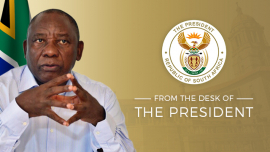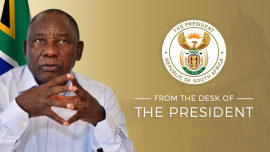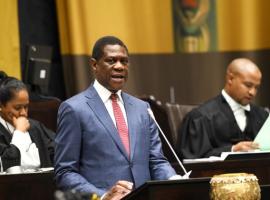
PRETORIA, June 27 (NNN-SANEWS) — With improved funding for South Africa’s Just Energy Transition, the country will be able to invest significantly in bolstering the electricity grid and new renewable energy generation.
In his weekly newsletter to the nation on Monday, President Cyril Ramaphosa said this will significantly help to end load shedding.
The President’s newsletter comes after his participation at the New Global Financing Pact Summit in Paris last week, where several world leaders gathered.
“With improved funding for our Just Energy Transition, we will be able to invest substantially in strengthening our electricity grid and new renewable energy generation.
“This will make a significant contribution to ending load shedding and securing a reliable and affordable supply of electricity. This will, in turn, promote economic growth, make our exports more competitive and create employment,” he said.
The President explained that the funding will enable the country to develop new industries, such as electric vehicles and green hydrogen, which will increase the country’s industrial output and create jobs for the economy of the future.
Through such funding, investment in infrastructure, expanding the capacity of the economy and reducing the costs for emerging businesses will be increased.
“There are immediate challenges that we are addressing as a country. We are working to accelerate the implementation of our Energy Action Plan and Economic Reconstruction and Recovery Plan so that we can end load shedding, grow the economy and create jobs,” he said.
At the same, the President stressed the importance of asserting the needs and interests of developing economies in international fora, so that the country can raise the funds that are required to achieve a just transition and advance developmental objectives.
This is important not only for people in South Africa, but for people throughout the Global South.
In summarising the outcomes of the Summit, French President Emmanuel Macron said: “More than ever, international solidarity and transfers from the richest countries to the most vulnerable ones are essential to shape a fairer world.”
President Ramaphosa said this is a view that African leaders share, and they will continue to work with other countries across the world to ensure that it becomes a reality.
Reflecting on the summit, President Ramaphosa reiterated that global development financing, if properly directed and provided on a significant scale, can make a huge difference to the lives of people living in countries like South Africa.
During the summit, the President told world leaders that the Global South “does not want to be treated like beggars, as if we are asking for charity”.
“The industrialisation and economic development of the Global North was achieved at the expense of the Global South. Wealthier countries therefore have both an obligation and an interest in supporting development and climate action in poorer countries.
“As South Africa, we argued for a fundamental overhaul of the international financial institutions that are responsible for supporting development across the world,” he said.
The President called for a restructuring of bodies such as the World Bank and International Monetary Fund to be more inclusive and responsive, saying they should provide funding in a way that does not increase the debt burden of countries that are already struggling to service their debt.
The President said the international community must appreciate the scale of the challenge and make sure that sufficient funds are available.
As a start, industrialised countries need to meet their existing commitments, such as mobilising $100 billion a year for climate action in developing economies. He said that even as this goal is achieved, much more money will be needed to ensure an effective response to climate change.
“While the Paris Summit is not a formal structure through which international agreements are reached, it is significant that there was broad consensus among most of the countries that much more funding is needed and that international development banks needed to be significantly reformed to direct that funding to where it will have the greatest impact.
“There was general agreement that additional private sector funding should be mobilised and that funding should be provided on better terms,” he said. — NNN-SANEWS






